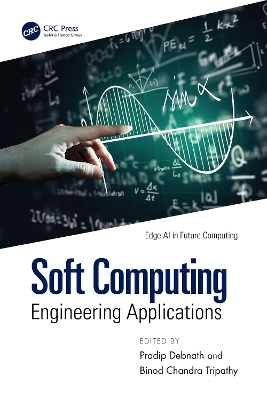
Soft Computing
CRC Press (Verlag)
978-1-032-73852-9 (ISBN)
The book explores soft computing techniques in a very systematic manner. It elucidates the concepts, theories, and applications of fuzzy sets, enabling readers to grasp the fundamentals and explore their applications in various fields. It provides new insight into unmanned aerial vehicle applications to fuzzy soft set based decision making. It then discusses new fixed point results in orthogonal neutrosophic generalized metric spaces and explores statistical convergence of triple sequences in a credibility space. The authors then provide readers with a solid grasp of the mathematical underpinnings of CNNs, enabling them to design, train, and optimize neural networks for image recognition, object detection, and other computer vision tasks. The authors also present new studies in fractional calculus and explores advanced visualization algorithms and techniques for big data analytics.
Soft Computing will be useful for beginners and advanced researchers in engineering, applied sciences and healthcare professionals working in soft computing applications.
Dr. Pradip Debnath is an Associate Professor in the Department of Mathematical Sciences at Tezpur University, India. He received his Ph.D. in Mathematics from the National Institute of Technology Silchar, India. His research interests include fixed point theory, functional analysis, soft computing and mathematical statistics. Prof. (Dr.) Binod Chandra Tripathy received his M.Sc. and Ph.D. degrees from the Berhampur University, Odisha, India. He is the Director, IQAC, Tripura University since March 2020. His research interests are Fuzzy set theory, Sequences of fuzzy numbers, Summability theory, Sequence space and Series, Sequences of complex uncertain variables, Spectral theory, Multiset topological space, Neutrosophic topological space, Decision making etc.
Chapter 1- Different types of convergence in fuzzy normed spaces
Chapter 2- Exploring statistical convergence of triple sequences in a credibility space
Chapter 3- Some results on triple sequence space in intuitionistic fuzzy anti-normed linear space
Chapter 4- Unmanned aerial vehicle application to fuzzy soft set based decision-making
Chapter 5- Fixed-point results on strong Jleli-Samet-F-metric spaces and applications
Chapter 6- Fractional-integral equations
Chapter 7- Measures of Noncompactness and solvability of fractional integral equations
Chapter 8- New fixed point results in orthogonal neutrosophic triple controlled rectangular b-metric spaces
Chapter 9- Intuitionistic fuzzy stability results of mixed type functional equation using classical approaches
Chapter 10- Enhancing paddy crop disease analysis with an intuitionistic fuzzy clustering algorithm
Chapter 11- Soft-rough expert set
Chapter 12- Gamma modules and gamma filters
Chapter 13- Soft computing techniques for enhanced E-commerce recommender systems
Chapter 14- Mathematical foundations of CNN in Soft Computing
Chapter 15- Fuzzy logic in predicting diseases: A paradigm shift in medical science
| Erscheinungsdatum | 11.09.2024 |
|---|---|
| Reihe/Serie | Edge AI in Future Computing |
| Zusatzinfo | 25 Illustrations, black and white |
| Verlagsort | London |
| Sprache | englisch |
| Maße | 156 x 234 mm |
| Gewicht | 843 g |
| Themenwelt | Mathematik / Informatik ► Informatik ► Netzwerke |
| Informatik ► Theorie / Studium ► Künstliche Intelligenz / Robotik | |
| ISBN-10 | 1-032-73852-9 / 1032738529 |
| ISBN-13 | 978-1-032-73852-9 / 9781032738529 |
| Zustand | Neuware |
| Informationen gemäß Produktsicherheitsverordnung (GPSR) | |
| Haben Sie eine Frage zum Produkt? |
aus dem Bereich


